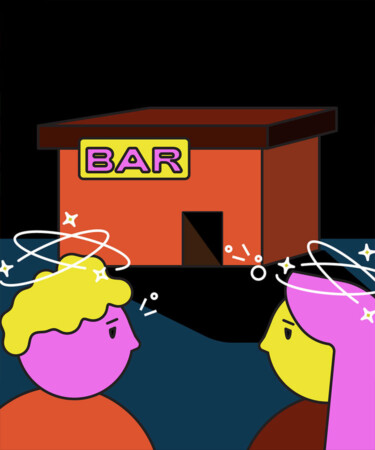When people stroll into our local watering hole, they tend to feel at ease. This calming sensation comes from familiarity and, of course, having a drink in hand. The drinks are familiar, as is the kind of buzz they provide. But when you head to a bar you’ve never been to, it can take a minute to get acclimated by soaking up the establishment’s general vibe, getting acquainted with the staff, and navigating the cocktail menu. But going to a new bar also presents a physiological learning curve as well.
As it turns out, science suggests that drinks tend to hit people faster and harder when they imbibe in an unfamiliar environment versus their usual haunts. To understand this phenomenon and the science behind it, we consulted the experts.
Making the Habit
Most of us are familiar with the famous Pavlov’s dog experiment. Russian physiologist Ivan Pavlov was conducting research on dogs’ digestion when he inadvertently discovered that he was evoking a conditioned response from his dogs during feedings. At the experiment’s start, the dogs began salivating only when presented with food, but they later started salivating at the sound of the bell they heard before feedings, too. A similar phenomenon takes place when humans decide when and where we consume booze.
“For example, if we routinely drink at the end of the day, our bodies start to expect it,” says Dr. David M. Goldberg, Ph.D., a clinical psychologist at Little Silver Behavioral Health. “We become conditioned to it being time to drink.” He also says we can become conditioned to internal cues.
“The stimulus can be blood sugar,” he explains. “When our blood sugars are down by the end of the day, we [may] think, ‘OK, it’s time to start drinking.’”
The same applies when we’re in environments that we associate with drinking, like bars we frequent. But that doesn’t always happen at unfamiliar bars — even if we mentally know we’re there to get boozy.
Planning Ahead
The second scientific reason your buzz may get boosted at a new watering hole is compensation, or our body’s desire to return to equilibrium when something happens to it.
“When we drink, the body has to detoxify and digest the alcohol,” Goldberg explains. “That’s a compensatory response.” And when we have that compensatory response multiple times under the same circumstances, we can become conditioned to expect it.
“Let’s say you’re going to a bar that you’ve been to before,” Goldberg posits. “Your body knows it’s about to get alcohol, and it’s going to get a head start on compensating for it, so it will take you longer to [feel] drunk.”
According to an article by Professor Meredith Palm of Baylor University in Texas, these responses can also elicit heightened pain sensitivity and decreased body temperature, thus possibly motivating drinkers to continue drinking in such situations in an effort to return to a state of equilibrium. But when we step into a bar we’ve never been to, the conditioned compensatory response doesn’t kick in, which can cause us to feel drunk faster after consuming even less alcohol.
“In such cases, our bodies aren’t already prepared to compensate for the incoming booze,” Goldberg says. “We’re not braced for it.”
So, when you’re at a new bar, don’t be surprised if you get a bit tipsy after only one or two cocktails. And if you’re at the local dive you frequent, know that science plays a role in why you might feel otherwise stone-cold sober after a couple shots of tequila.
*Image retrieved from Nomad_Soul via stock.adobe.com
